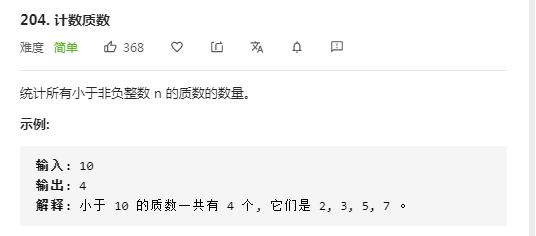
思路为:
1->2是质数,所有是偶数的都是2的倍数一定不是质数(除了2,偶数一定不是质数,因此我们不需要考虑任何偶数)
2.->从3开始考虑到n的奇数,其中某个数,如3的所有整数倍的数都不是质数,我们需要找到不小于n为止,即全部考虑到
->这样的话,当我们遍历到9的时候,因为9不是第一次出现,他已经被3考虑为非质数了。
//代码如下:
public int countPrimes(int n) { int res=0; if(n>2) res++; else return res; boolean[] notPrime=new boolean[n];//偶数一定不是质数,因此我遍历所有奇数寻找质数 for(int i=3;i<n;i+=2){ if(!notPrime[i]){//如果是质数 res++; for(int j=3;i*j<n;j+=2){ notPrime[i*j]=true; } } } return res; }
//当我们为3的时候已经把n内所有3的倍数都设置过了,当为5的时候我们就没必要再去设置*3了,当为7的时候就没有必要设置*3和*5的了,由此我们优化为下方代码
每次直接从他的本身为倍数起始即可!
public int countPrimes(int n) { int res=0; if(n>2) res++; else return res; boolean[] notPrime=new boolean[n]; //偶数一定不是质数,因此我遍历所有奇数寻找质数 for(int i=3;i<n;i+=2){ if(!notPrime[i]){//如果是质数 res++; for(long j=i;i*j<n;j+=2){ notPrime[(int) (i*j)]=true; } } } return res; }
如果求前n个(不包含n)全部的质数数组则代码如下:
public static int[] getPrimes(int n){ if(n<2)return null; int count=0; boolean[] notPrimes=new boolean[n]; //偶数只有2是质数 for(int i=3;i<n;i+=2){ if(!notPrimes[i]){ count++; for(long j=i;j*i<n;j+=2){ notPrimes[(int) (i*j)]=true; } } } int[] res=new int[count+1]; res[0]=2; int index=1; for(int i=3;i<n;i+=2){ if(!notPrimes[i]){ res[index]=i; index++; } } return res; }